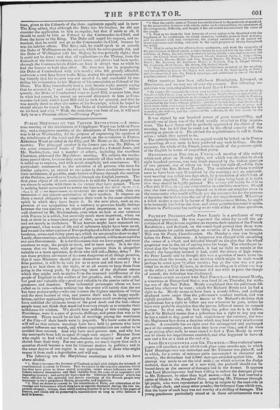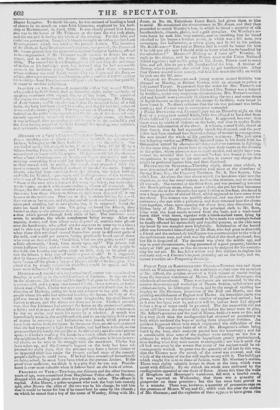PRUDENT DECISION.—Sir Peter Laurie is a gentleman of very exemplary
prudence. He was requested the other day to call the pa- rishioners of Marylehone together, to express their opinion of the French Revolution ; and declined, on the sound legal ground that there were no precedents for parish meetings on occasions of a French revolution. This was Sir Peter, Churchwarden. On Monday a case was brought before Sir Peter, Alderman. A bargeman was charged with assaulting the owner of a wharf, and defended himself on the plea that the wharf proprietor was in the act of casting loose his barge. The wharfinger in- sisted that the barge being unloaded, it had no right to remains at the wharf: the bargeman insisted it had, until the return of high water. Sir Peter Laurie said he thought this was a question of much more im- portance than the assault, as any decision which might be made would perhaps be acted upon ay other parties ; but as the case was not pro- vided for ins the City By-laws, he declined deiuiizm on it either Me wear- er the other ; and as the complainant did not will to press the charge of assault, the defendant was discharged.
CO3IBINATION AGAINST THE NEV.' POLICE.—A man named Moody, a waterman at Hungerford Stairs, was fined 51. on Thursday, for strike ing one of the New Police. Moody complained that the policeman fol- lowed him wherever he went ; which Sir Richard Birnie said he had ti right to do. Moody see= to have been a moody fellow, and perhaps displayed more anger than the policeman's conduct merited, and was rightly punished. But still, we denim. to Sir Richard's doctrine that a policeman has a right to follow any one wherever he goes, unless he have very probable suspicion that the person followed means to commit a crime. In that case, the best thing the police can do is to follow. But if Sir Richard means that a policeman has a right to dog any one he has a mind to dog, good or bad, suspicious or the contrary, the wor- thy Magistrate lays down a doctrine which may lead to very mischievous results. A constable has no right over the unsuspected and uncharged pact of the community, more than they have over him ; and if he were to go prying after such, he must expect to find a Tom Moody in every one to whom his impertinence extended, and who happened to have an arm and a fist or a stick at the end of it.
LORD HUNTINGTOWER AND MR. TRIMMER.—Most readers of news- papers will recollect a trial which took place some months ago, in which Lord Huntingtower was defendant and Mr. Trimmer was plaintiff, and in which, for a series of outrages quite unexampled in character and atrocity, the defendant had 2,000/. damages awarded against him. An attempt was made to set the trial aside ; on which occasion the Judge declared, that in the case of a new trial, the plaintiff should not be bound down to the amount of damages laid in the former. It appears that Lord Huntingtower had been willing to reduce the damages given. to Mt. TriMmer, by Other than legal means,—that he had inserted a series of libels in the Stamford-News, attacking Mr. Trimmer through hi g pupils, who-were represented as firing at targets by the road-side at the village clock, and many tather pranks,- theinference from which was, that the tutor of such boys was not worthy of a shilling of damages. The young gentleman particularly aimed at in these advertisements was a Master Langdon. To finish his case, he was accused of heading a band of rioters in an attack on some Irish labourers, employed by his lord- ship at Buckminster, in April, 1829. It was clearly proved that Lang. don was in the house of Mr. Trimmer at the time the riot took place, and did not quit it during the whole of the evening. For this false and malicious prosecution, Langdon's friends brought an action against Lord Huntingtower, which was tried at the present Assizes. The insertion cif the libels, at Lord IInnthigtower'e expense, was proved; the Reverend 141r. Evans proved that the prosecution atesinst Langdon had been offered to be compromised, if Mr. Trimmer' wealth eonsent to forego his da- mages, and to exchange his living. Mrs. Langdon proved the same thing. The counsel for Lord lluntingemer -lid not deny the existence of malice on his lordship's part, telt insisted that he had reasonable grou lids for indicting young LanTlon ; and called three witnesses, whose evidence was very light]: revel-A.1 l.y the Ghat and the Jury,— which, after a few minutes' censideration, gave :2 eerdiet of 1,0001. against his lordship:. Lord Iluntingtower will pair-tire he erect another penfold, or swear to another indictment.
1enet,7Esr ON TM: .Boy.—A respectable widow lady named
who resided in Judd Street, died on Saturday nip;ltt, rather suddenly, of apoplexy combined with organic disease of the heart. The nature of the disease was clearly stated to the inquest by the surgeon, Mr. Cramp, of Judd Street ; and it was also titated, that the deceased beine of a full habit, the body had been placed in iicalm and ti :e ILI had been screwed down and the seams pitched. The inqseo et :,:t Thertaay. The Jury insisted on the coffin belie; opentel; an,1 • .eis of do deceased stre- nuously opposed it, because el t,
it was arranged, that an openia• 1•,• : the Jury having peeped at the body claimed and returned a verdict accordingly. ensue. At length "e time coffin-lid ; and _ea weee satisfied,



























 Previous page
Previous page